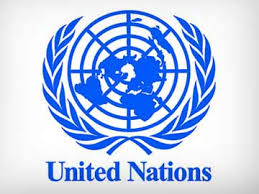The UN says its agencies, the World Food Programme and UNICEF are increasing food and nutrition services to urgently reach 1.8 million people in Borno and Yobe.
Deputy Spokesman for the Secretary-General, Farhan Haq, said at a press briefing at the UN headquarters in New York on Tuesday that food insecurity had reached an extreme level in northeast.
He said that “in Nigeria, our colleagues from the World Food Programme (WFP) and UNICEF are rolling out a rapid response mechanism to deliver food, health and nutrition services in difficult-to-reach areas in Borno and Yobe states.
“The two states are worst affected by hunger and malnutrition in northeastern Nigeria.
“This is part of WFP’s larger response plan – to gradually scale up to reach 1.8 million people with urgent food and nutrition support throughout 2017,” he said.
According to him, food insecurity has reached an extreme level in parts of northeastern Nigeria, where 4.6 million people are going hungry.
“Without urgent support, hunger will only deepen.
“Since August, the number of people needing urgent food assistance has increased from about 1 million to 1.8 million in Borno and Yobe states,” he said.
Haq also said that the Security Council was meeting on the cooperation between the UN and regional organisations, including the AU.
“The Special Representative of the Secretary-General to the African Union, Haile Menkerios, told the Council that the conflicts we face in Africa today have grown in scale and complexity.
“Menkerios said this poses a greater threat to international peace and security.
“A review of UN-AU partnership so far, characterised by a widening series of ad-hoc collaborative engagements, amply demonstrates that it is time the two organisations move towards a more structured, systematic and predictable partnership.
“In that context, Menkerios stressed that predictable and sustainable funding remains a major challenge for the African Union,” he said.
On South Sudan, Haq said the Special Representative of the Secretary-General in South Sudan, Ellen Løj, briefed the Security Council and warned of deterioration of the economy and the increasingly fragmented conflict, often with ethnic undertones.
According to him, the situation had placed the country on a potential downward slide towards greater divisiveness and risk of a full-scale civil conflict.
He said Løj called on the Transitional Government to do more to put an end to security incidents that contribute to an environment of instability and violence, lead to displacement and exacerbate the already dire humanitarian situation.
He quoted Loj as saying that: “The guns have to be silenced if the suffering of the people is not going to become even more dire”.
On Democratic Republic of the Congo, Haq said the Secretary-General took note of the appointment of Samy Badibanga as Prime Minister of the Republic.
“The Secretary-General welcomed this first concrete step in the implementation of the 18 October political agreement, which is expected to culminate in the holding of credible elections in the country.”
He added that the Assistant Secretary-General for Human Rights Andrew Gilmour would visit the country from Nov. 21 to 26.
On Central African Republic, the deputy spokesperson said the UN Mission in the country (MINUSCA) welcomed the announcement that donors had committed over two billion dollars to fund the recovery and peacebuilding plan.
“The Special Representative for the Central African Republic, Parfait Onanga-Anyanga, noted that this marked a day of hope and trust of the international community in the Central African Republic, its people and Government.” (NAN)

